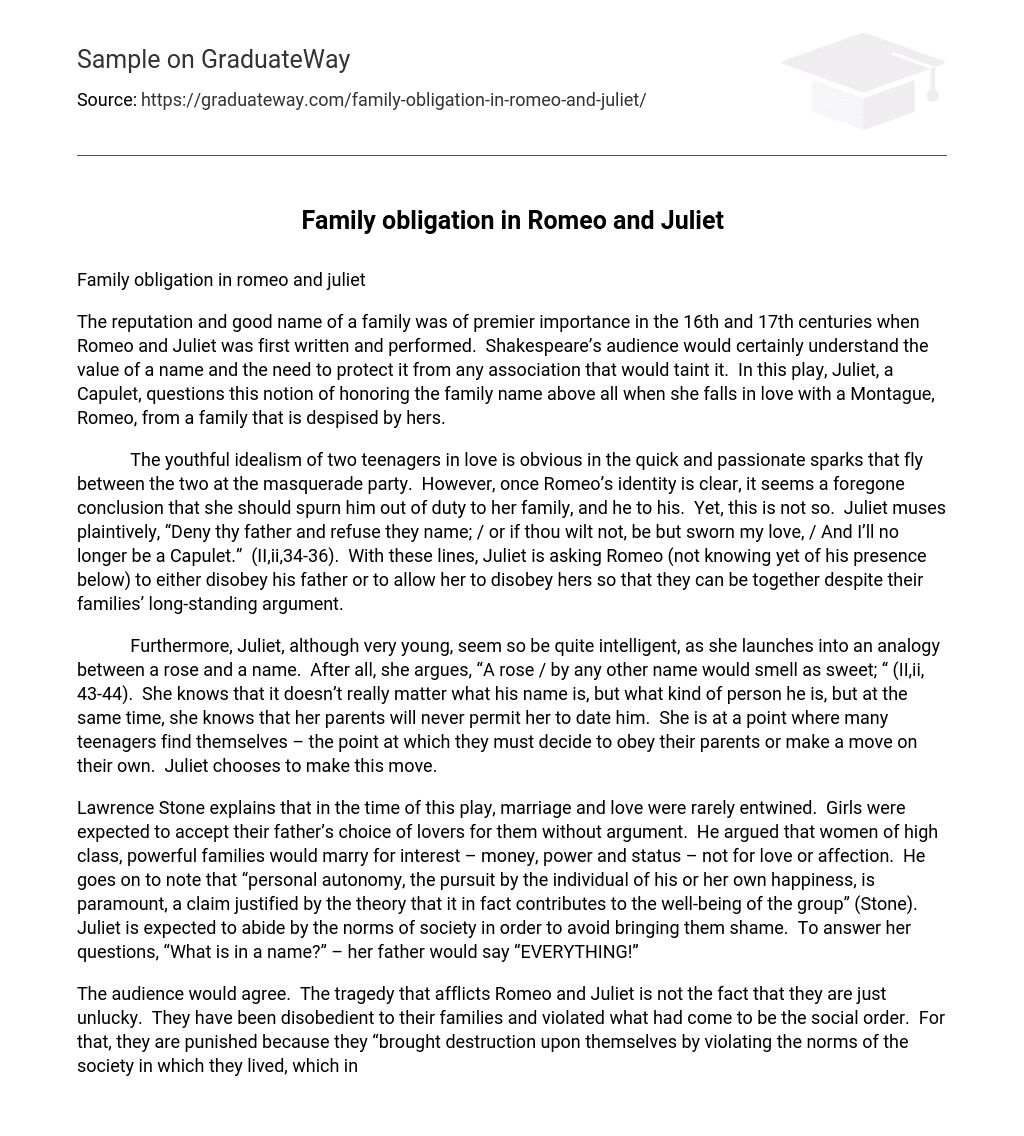The reputation and good name of a family was of premier importance in the 16th and 17th centuries when Romeo and Juliet was first written and performed. Shakespeare’s audience would certainly understand the value of a name and the need to protect it from any association that would taint it. In this play, Juliet, a Capulet, questions this notion of honoring the family name above all when she falls in love with a Montague, Romeo, from a family that is despised by hers.
The youthful idealism of two teenagers in love is obvious in the quick and passionate sparks that fly between the two at the masquerade party. However, once Romeo’s identity is clear, it seems a foregone conclusion that she should spurn him out of duty to her family, and he to his. Yet, this is not so. Juliet muses plaintively, “Deny thy father and refuse they name; / or if thou wilt not, be but sworn my love, / And I’ll no longer be a Capulet.” (II,ii,34-36). With these lines, Juliet is asking Romeo (not knowing yet of his presence below) to either disobey his father or to allow her to disobey hers so that they can be together despite their families’ long-standing argument.
Furthermore, Juliet, although very young, seem so be quite intelligent, as she launches into an analogy between a rose and a name. After all, she argues, “A rose / by any other name would smell as sweet; “ (II,ii, 43-44). She knows that it doesn’t really matter what his name is, but what kind of person he is, but at the same time, she knows that her parents will never permit her to date him. She is at a point where many teenagers find themselves – the point at which they must decide to obey their parents or make a move on their own. Juliet chooses to make this move.
Lawrence Stone explains that in the time of this play, marriage and love were rarely entwined. Girls were expected to accept their father’s choice of lovers for them without argument. He argued that women of high class, powerful families would marry for interest – money, power and status – not for love or affection. He goes on to note that “personal autonomy, the pursuit by the individual of his or her own happiness, is paramount, a claim justified by the theory that it in fact contributes to the well-being of the group” (Stone). Juliet is expected to abide by the norms of society in order to avoid bringing them shame. To answer her questions, “What is in a name?” – her father would say “EVERYTHING!”
The audience would agree. The tragedy that afflicts Romeo and Juliet is not the fact that they are just unlucky. They have been disobedient to their families and violated what had come to be the social order. For that, they are punished because they “brought destruction upon themselves by violating the norms of the society in which they lived, which in the former case meant strict filial obedience and loyalty to the traditional friendships and enmities of the lineage” (Stone).
The family reigned supreme in this time period. It does not really matter what the feud between the Montagues and Capulets concerns. What matters is that the ties of family are intended to be much stronger than the selfishness of love. Juliet did not understand this, and she meets a tragic end.
Works Cited
Shakespeare, William. Romeo and Juliet in The Complete Works of William Shakespeare. Glasgow, Harper Collins, 2006
Stone, Lawrence. “Marriage to Whom?” The Family, Sex and Marriagein England 1500-1800.
Retrieved 8 April 2007 from http://www.troynovant.com/Franson/Shakespeare/
Romeo-and-Juliet.html





